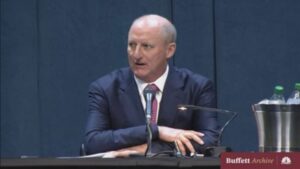The European Central Bank on Thursday delivered a widely expected increase in interest rates, citing inflation that continues to run too hot while saying future moves will depend on incoming economic data.
The ECB raised its deposit rate by 25 basis points, or a quarter of a percentage point, to 3.75%. The bank’s refi rate and the rate on its marginal lending facility were also lifted by a quarter-point each. The ECB has lifted rates in nine consecutive meetings.
“Inflation continues to decline but is still expected to remain too high for too long,” the ECB said in a statement. “The Governing Council is determined to ensure that inflation returns to its 2% medium-term target in a timely manner.”
ECB President Christine Lagarde, in a news conference, said the decision to hike rates was “unanimous,” while keeping options open when it comes to the next policy meeting in September.
“There is the possibility of a hike; there is the possibility of a pause,” Lagarde said. “It’s a decisive ‘maybe’…the burden of proof is going to be [on] the data.”
Lagarde’s remarks came after the Federal Reserve on Wednesday delivered a widely expected quarter-point rise in interest rates, while Chair Jerome Powell emphasized that data and other developments would determine whether to raise rates or hold steady in September.
See: Fed no longer foresees a U.S. recession — and other things we learned from Powell’s press conference
The move comes as the eurozone economy continues to slow, but inflation remains stubbornly above the ECB’s target. While Thursday’s move was widely anticipated, investors have grown less sure about the prospect for another hike when policy makers next meet in September.
Much like the Federal Reserve, which delivered a quarter-point rate rise on Wednesday, the ECB emphasized that future moves would depend on incoming data.
ECB watchers also noted a shift in language in the bank’s policy statement, which previously said rates would be “brought to” sufficiently restrictive levels. Thursday’s statement siad rates would be “set at sufficiently restrictive levels for as long as necessary” to return inflation to the ECB’s medium-term target.
“This language conveys no bias to raising rates further and also starts to shift the emphasis from rate hikes to the holding at restrictive levels — the ‘longer’ part of ‘higher-for-longer’ rates,” said Krishna Guha, head of the global policy and central bank strategy team at Evercore ISI, in a note.
The euro
EURUSD,
was down 0.5% at $1.103 versus the dollar as investors also weighed a raft of U.S. economic data.
German government bond prices rose, pulling down yields, with the rate on the 2-year maturity
TMBMKDE-02Y,
down nearly 9 basis points near 3.03%, while the 10-year bund yield
TMBMKDE-10Y,
fell 7 basis points to around 2.42%.
The pan-European Stoxx 600 Europe
SXXP,
index rose 1.4%.
After Lagarde and the ECB forcefully rejected a pause in September, policy makers have now signaled “all options open for September, probably,” said Claus Vistesen, chief eurozone economist at Pantheon Macroeconomics, in a note.
This post was originally published on Market Watch






